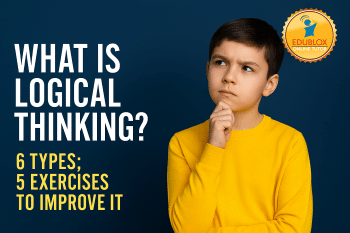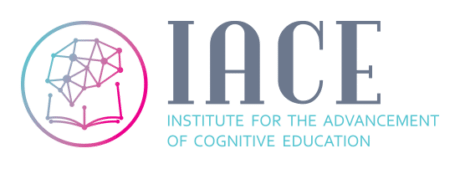
You have four blocks in front of you: a black one, a red one, a white one, and a green one. You must remove two of them. But there’s a catch — you may not take away the red, the black, and the white blocks at the same time, nor the white, the green, and the red ones simultaneously. Which two blocks can be removed?
To solve this puzzle, you need to think logically.
What is logical thinking?
Logical thinking is the process of using reasoning consistently to come to a conclusion. Synonyms include logical reasoning, reasoning skills, and reasoning ability.
Put simply, logical thinking means following a chain of reason, step by step, to reach a valid conclusion.
Problems or situations involving logical thinking call for structure, relationships between facts, and chains of reasoning that “make sense.”
In his book Brain Building, Dr. Karl Albrecht explains that the basis of all logical thinking is sequential thought. This means taking the important ideas, facts, and conclusions in a problem and arranging them in a step-by-step progression that creates meaning. To think logically is, in essence, to think in steps.
6 Types of logical thinking
In logic, there are two broad methods of concluding: deductive reasoning and inductive reasoning. In addition to these, several other reasoning types play a crucial role in learning and problem-solving.
1. Deductive reasoning
Definition: Deductive reasoning starts with a broad truth (major premise) and applies it to a specific case (minor premise) to reach a conclusion.
Example:
- Major premise: All men are mortal.
- Minor premise: Socrates is a man.
- Conclusion: Socrates is mortal.
Why it matters: If both premises are true, the conclusion must be true. Deductive reasoning teaches students to apply general rules to specific cases with certainty.
2. Inductive reasoning
Definition: Inductive reasoning draws broad conclusions from specific observations.
Example: After seeing ten white swans, we might conclude that all swans are white.
Why it matters: Inductive reasoning is powerful for forming hypotheses, but its conclusions can be disproven. Students learn to generalize patterns from data while remaining open to exceptions.
3. Linear reasoning
Definition: Linear reasoning follows a clear, step-by-step progression, like moving along a straight line.
Example: Solving a multi-step math problem by following a known procedure.
Why it matters: Linear reasoning is closely linked to traditional measures of intelligence and is central to academic learning, particularly in mathematics.
4. Conditional reasoning
Definition: Conditional reasoning uses if–then statements to form conclusions.
Example: If it rains, the ground gets wet. It is raining. Therefore, the ground is wet.
Why it matters: Students encounter conditional reasoning in math proofs, scientific hypotheses, and even everyday decision-making. It sharpens their ability to evaluate whether conclusions truly follow from given conditions.
5. Cause-and-effect reasoning
Definition: Cause-and-effect reasoning looks for relationships where one event causes another.
Example: Eating too much sugar may lead to health problems.
Why it matters: This reasoning helps students understand real-world systems and consequences. It underpins scientific thinking and supports making responsible choices.
6. Analogical reasoning
Definition: Analogical reasoning draws conclusions by comparing similarities between two things.
Example: Eating too much refined sugar is analogous to smoking cigarettes. Both are unnecessary for survival and can lead to poorer health outcomes.
Why it matters: Analogical reasoning helps students apply known ideas to new situations. Strong analogies reveal meaningful connections that foster deeper understanding.
.
Importance of logical thinking for students
Logical thinking skills allow learners to understand what they have read or been shown and to build upon that knowledge without constant guidance. These skills teach students that knowledge is fluid and builds on itself.
Key reasons logical thinking matters:
- Improves reading comprehension
The relationship between reasoning and reading is well established in research. It has been said that “there is no reading without reasoning” — reading itself is a form of reasoning.
- Strengthens math foundations
Logical reasoning underpins mathematics. “Learning mathematics is a highly sequential process,” writes Dr. Karl Albrecht. “If you don’t grasp a certain concept, fact, or procedure, you can never hope to grasp others that come later, which depend upon it.” For example, to understand fractions, you must first understand division; to solve algebra equations, you must first master fractions.
- Supports academic achievement
A study by Bhat (2016) examined six components of reasoning ability — inductive, deductive, linear, conditional, cause-and-effect, and analogical reasoning — in 598 students. These components explained 31.5% of the variation in academic achievement.
- Encourages persistence and problem-solving
Logical thinking empowers children to move beyond quick answers like “I don’t know” or “this is too difficult.” Instead, they learn to explore their own thinking, test hypotheses, and build a deeper understanding of both the methods and solutions.
- Builds independence
Training in logical reasoning teaches students to think for themselves, question assumptions, and evaluate information critically. These are lifelong skills that benefit both learning and everyday decision-making.
A learned mental process
Reasoning ability is not magical or fixed by genetics. It is a learned mental process that can be taught, trained, and strengthened. Specific training in logical thinking encourages learners to think for themselves, question assumptions, develop alternative hypotheses, and test them against known facts.
Like physical training, cognitive training should be balanced. Overdeveloping one skill while neglecting others can create weaknesses — much like overtraining one muscle group in the gym. The brain works the same way. In Maguire et al.’s (2006) study of London taxi drivers, growth in the posterior hippocampus (from years of navigation experience) came at the cost of reduced anterior hippocampal volume. This illustrates how uneven training can strengthen one area while weakening another.
The best approach is multi-cognitive training, where skills such as memory, attention, and reasoning grow together. Research also points to the role of mutualism, where cognitive abilities support one another’s growth. Strong reasoning skills help learners build vocabulary more quickly, while richer vocabulary, in turn, enhances reasoning (Kievit et al., 2017).
This is why programs like Edublox’s Development Tutor integrate multiple cognitive skills, not just reasoning in isolation. A few minutes of structured training several times a week can strengthen the foundations for learning, and logical thinking is a core part of that foundation.
Therefore, in addition to completing Development Tutor program four to five times a week for 15–20 minutes per session, the following short activities (4–5 minutes each) can further strengthen reasoning skills:
- Logical thinking exercise with objects
- Logical thinking exercise with colors
- Logical thinking exercise with letters
- Logical thinking exercise with numbers
- Logical thinking exercises for advanced learners.
Beyond food, water, and shelter, education is the one necessity that empowers a person to secure the others consistently. Yet, within education, the importance of logical thinking is too often underestimated. As a result, reasoning ability—the very skill that underpins problem-solving, decision-making, and lifelong learning—remains one of the most neglected areas of training.
Edublox offers cognitive training and live online tutoring to students with dyslexia, dysgraphia, dyscalculia, and other learning disabilities. We support families in the United States, Canada, Australia, and beyond. Book a free consultation to discuss your child’s learning needs..
References for What Is Logical Thinking? 6 Types; 5 Exercises to Improve It
Albrecht, K. (2012). Brain building: Develop your logic muscles. CreateSpace Independent Publishing Platform.
Bhat, M. A. (2016). The predictive power of reasoning ability on academic achievement. International Journal of Learning, Teaching and Educational Research, 15(1), 79–88.
Kievit, R. A., Lindenberger, U., Goodyer, I. M., Jones, P. B., Fonagy, P., Bullmore, E. T., & Dolan, R. J. (2017). Mutualistic coupling between vocabulary and reasoning supports cognitive development during late adolescence and early adulthood. Psychological Science, 28(10), 1419–1431.
Maguire, E. A., Woollett, K., & Spiers, H. J. (2006). London taxi drivers and bus drivers: A structural MRI and neuropsychological analysis. Hippocampus, 16(12), 1091–1101.
- What Is Logical Thinking? 6 Types; 5 Exercises to Improve It was authored by Sue du Plessis (B.A. Hons Psychology; B.D.), an educational specialist with 30+ years of experience in the learning disabilities field.
- Edublox is proud to be a member of the Institute for the Advancement of Cognitive Education (IACE), an organization dedicated to improving learning through cognitive education and mediated learning approaches.



